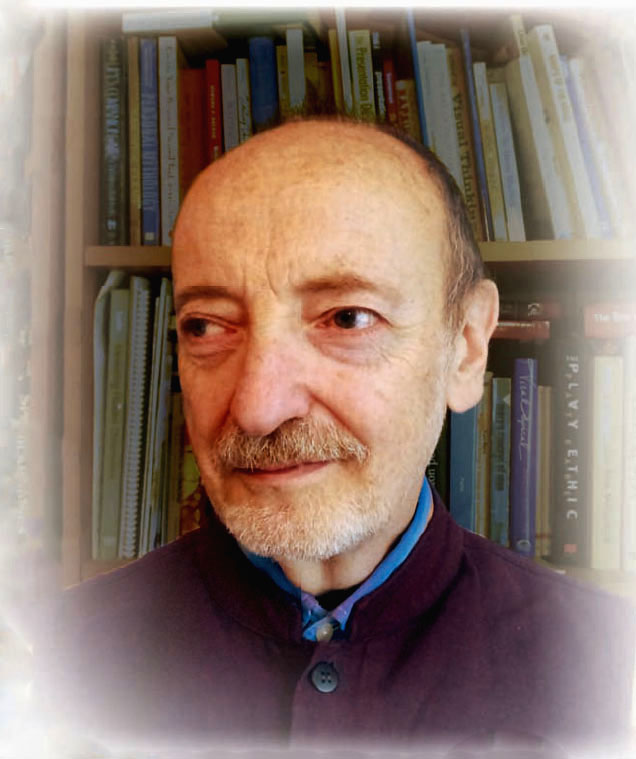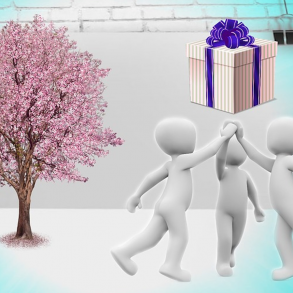The three breakthroughs that Frederic Laloux discovered during his research on the Reinventing Organizations: A Guide to Creating Organizations Inspired by Next Stage of Human Consciousness—evolutionary purpose, self-management, and wholeness—have profound implications way beyond the organizational context. They can serve as a guide to our personal and planetary development as well, if we explore their meaning in the zoom-in scale of the individual and the zoom-out scale of social and global systems. In this column, I suggest ways for using them to support our individual journey to Teal. In the next one, in the November 2015 issue, I will dive into their planetary dimension.
“Teal” is a fast-spreading meme, introduced by integral philosopher Ken Wilber and popularized by Laloux’s book. It is a shorthand for the “next stage in human consciousness” referred to in the book’s subtitle. People in Teal-inspired companies are frequently asking, what is the essential quality of an individual at the Teal stage of development? To answer in 10 words or less, I’d say: sensing, thinking, speaking, acting beyond “small self”, with increasing consistency. The next question I hear from them is what it takes to get there? What do we need to strengthen in ourselves to develop that quality of being?
If you’re aspiring for that, the following simple framework that outlines some of the core competences to cultivate, might help. It was inspired by Frederic Laloux’s book Reinventing Organizations and based on my action-inquiry into what “evolutionary purpose”, “wholeness” and “self-management” mean as individual practices.
This framework is in continuous development, fed by the experience of my work with leaders in various “next-stage” organizations, aspiring to more fully embody Teal ways of being and working. Of course, I’m also looking for learning from your comments and self-observations of how the suggested three disciplines work for you. Please leave a reply at the bottom of this page.
- Evolutionary purpose
“What is this life, this living system’s creative potential? That’s what we mean by evolutionary purpose: The deepest creative potential to bring something new to life, to contribute something energetically, valuable to the world.”
When Brian Robertson wrote that, he had organizations in mind and so did Laloux when he quoted Robertson in his book. However organizational reinvention efforts tend to fail if their champions don’t seek to realize the Teal breakthroughs, including their own life being pulled forward by an evolutionary purpose.
To find that kind of purpose, you have to reach for a space where your heart’s true desire, your deepest talents, and highest aspirations meet a need in your community, organization and the world, which you feel called to address.
Take your time to re-read and sit with the paragraph above. Turn your attention to your breath, as you re-read it. Listen to the creative impulse that wants to manifest through you, by asking: In what kind work can I find most joy? What is the tension in my environment that is crying out the loudest for my help? Where the answers to those questions meet, there you will find your evolutionary purpose. For now.
Then, you need to keep those questions fresh, vibrantly alive, and use them as the North Star on your journey to the land of Teal freedom from slavery imposed by your “small self”.
- Self-management
People in self-managed companies need to operate from a deeper knowledge of both self and their work environment. A low level of knowledge of the organization’s operating conditions, of the Roles and Accountabilities that dovetail with one’s own, can undermine one’s effectiveness in a self-managed organization. A low level of awareness of one’s own needs, values, moods and of tools for managing them, can cause the same.
Self-management in an individual context calls for a moment-to-moment awareness of what arises from within, as well as of tensions and opportunities for individual action arising from the workplace. Only then can individuals and groups develop practices that prepare them to work together harmoniously under any condition, even challenging situations.
The requisite competences in self-management include self-reflection, quiet-mind skills, perspective-taking, listening to and “reading” our felt sense, and paying attention to what we pay attention to.
Here’s an example of simple practices to grow your “quiet mind” muscles that you can exercise right now. As you read the rest of this column, try to remember to keep some of your attention on your breath at the same time as you’re getting the meaning of each sentence. This one is not an easy practice because the mind tends to jump either to the sentence or to the breath, instead of remaining alert to both. But as with any practice, over time, you can become better at it.
You may find that helpful when, next time, you talk with someone and try to pay attention to your breath or heartbeat, while fully absorbing what you hear from the other person. Notice how this changes the quality of your presence to yourself and to her or him.
- Wholeness
People “going Teal” enjoy bringing the whole of who they are to work, instead the mask of a narrow, “professional self.” They feel free to share the inner experience of their work and show up in authentic way without hiding their vulnerability. Tealers are in touch with their emotions and capable to express even the so-called “negative” ones, without harming others. They don’t play “games” and enjoy genuine relationships with no need to play “nice”.
Another aspect of your wholeness manifests in the conscious relating to the variety of roles you are energizing in work and life, as expressing and energizing the multi-dimensional creativity of all who you are. Why not create now (and update periodically) a profile of the roles that you’re filling, and make an inventory of various talents of yours that come out to play in each. Explore how they contribute to strengthen each other.
The requisite competences of growing in wholeness include: conflict resolution, intuition, imagination, generative listening, celebrating accomplishments, and managing the distribution of one’s attention and energy across a portfolio of one’s roles, and most importantly, caring for the wellbeing of all aspects of a diversity, and align them functionally into a working system.
(Read also the blog on What does Wholeness mean in the context of Teal Organising?, by my colleague, Celine McKeown.)
If you feel like accelerating your journey
Some people are happy to learn from life haphazardly, others are more intentional and prefer to accelerate their evolutionary journey. Chances are that you belong to the second group and want to know what you can do to move along the path a bit more briskly. If that’s the case, here are a few tips.
- For starters, read the Reinventing Organizations book, watch the video, and browse the wiki.
- Then join a meet-up group or a community of practice or an online network, focused on next-stage, or self-managing, or Teal organizations, under any other name, and explore with them what “next stage” means in an individual context for other people.
- Support and get involved with Enlivening Edge.
- Find and engage the service of a personal mentor trained in vertical development. If you do, make sure that the chosen person honors this timeless wisdom: “Only what you are, what you have realized and embodied, can you support in others.” (Thomas Hübl)
One last thought. Never forget that Teal is not a thing to acquire but an experience to enjoy. Yes, it is also a stage on our journey, but not the end stage, because our evolution is never ending. And because we can’t evolve as separate selves, only co-evolve with others, sharing the journey with caring others is the best way to reach your next stage of potential whatever it is.
 George Pór is an evolutionary thinker, strategic learning partner to Teal-inspired changemakers, and social movement builder, living in London. He is a Fellow of Future Considerations, originator and Lead Link of Enlivening Edge.
George Pór is an evolutionary thinker, strategic learning partner to Teal-inspired changemakers, and social movement builder, living in London. He is a Fellow of Future Considerations, originator and Lead Link of Enlivening Edge.





Thanks a lot for this article. Very clear and inspiring. It gives me link between the change in a structure (going to holacracy for ex) and the changes for the people. My purpose is to make the change for the people smooth. So this article gives me valuable information.
Regards
Deborah, reading your tagline “TRANSFORMING BUSINESS, SOCIETY AND SELF,” I realized that we are really on the same path. How can we support each other on the journey?
Dear Georg, I know that you did it already with this article:-) So, how could I give you some support?? I’ve just tweet, Facebook and Linkedin your article, as a start!
I am in a part of my life where I need very pragmatic things. I’d looked at the role you need to energize but I don’t see a “good” place for me. Do you have any suggestion?
Regards
No suggestion (yet), but a better question than the one that I just asked a few minutes ago, thanks to your reply to it. The fact that you facilitate seminars and events about collective intelligence, and I’ve been researching the same for 30 years and have been blogging about it here http://blogofcollectiveintelligence.com/ led me to the new question:
Can we create a greater value for the world together that we couldn’t separately?
May our exchange grow into an example of how each meaning-full conversation can become yet another opportunity to reinvent ourselves. If you are interested to continue it, drop me a line at george(at)futureconsiderations(dot)com.
“People in self-managed companies need to operate from a deeper knowledge of both self and their work environment. A low level of knowledge of the organization’s operating conditions, of the Roles and Accountabilities that dovetail with one’s own, can undermine one’s effectiveness in a self-managed organization. A low level of awareness of one’s own needs, values, moods and of tools for managing them, can cause the same.”
To me this is a pivotal observation. This high level of self-awareness is not the norm in our culture. It shifts my whole understanding of why I am working, who I want to work with and for what purpose. In an organisation like the NHS or Social Services that still operate in a top down manner with many layers of management and a total lack of transparency, how could I start to talk about self-management to colleagues as being in everyones best interest?
Also as you say “self-management requires competences that include self-reflection, quiet-mind skills, perspective-taking, listening to and “reading” our felt sense, and paying attention to what we pay attention to”. In my experience these competencies need continuous developing and refining.
Should I be responsible for developing these competencies outside of my work or should it be part of professional development (L & D) within an organisation?
> Should I be responsible for developing these competencies outside of my work or should it be part of professional development (L & D) within an organisation?
The answer is “yes” 🙂
I mean not “or” but “both.”
If we don’t train our competences in personal self-management in all places where our life plays out (including the workplace), then we won’t reach higher stages of our potential as human beings. So in that sense, it is an individual response-ability. But it’s more than that.
An organization that doesn’t care about, or gives only lip service to, the development of its members will end up with members who don’t care about the organization. It is increasingly so in an age , when people expect more from it than just a paycheck. That’s probably one of the underlying reasons for the disastrous disengagement statistics quoted in the Editorial of the Sepember 2015 issue of EE. .
The new wave of Teal-inspired organizations distinguish themselves by supporting their members’ wholeness at work, including the provision of reflective spaces:
“Wisdom traditions insist on the need for regular silence and
reflection to quiet the mind and let truth emerge from a deeper part of
ourselves. An increasing number of people pick up contemplative
practices―meditation, prayer, yoga, walking in nature―and integrate
these into their daily lives. Many organizations researched for this book
have set up a quiet room somewhere in the office, and others have put
meditation and yoga classes in place. This practice opens up space for
individual reflection and mindfulness in the middle of busy days.” (Reinventing Organizations, by Frederic Laloux)
An organization doesn’t even have to be Teal-inspired to do that. From Wall Street backs to high-pressure tech companies, management is learning that mindfulness courses are a good investment in employee productivity.
The Teal difference is on the focus of creating conditions for people to experience their autonomy and pursue their evolutionary purpose.
Thanks for this. What I found most compelling, and what most people seem to struggle with is the need to match your desires and aspirations to meet a need. Many people manage the first two but struggle with the last connection, which leads to the creation of roles that serve a personal need but not necessarily a global community/company need.
I also loved the idea of examining the roles that you presently hold and creating a profile that you can then analyze the various talents you bring to those roles. I believe that this allows you to recognize the patterns and reflect on the pieces that really energize and can drive you and your talents/mission forward. Lastly, I appreciated this portion, “You may find that helpful when, next time, you talk with someone and try to pay attention to your breath or heartbeat, while fully absorbing what you hear from the other person. Notice how this changes the quality of your presence to yourself and to her or him.” I teach a mentor fundamentals workshop in which I express the need for remaining quite when listening, not just verbally, but mentally. I struggle with tips on how to accomplish this, not easy, task. That tip you gave, I hope, will be very helpful.
Hi Bruce, thank you for your feedback and sharing your challenge in teaching the mentor fundamentals workshop. That would be lovely if our conversation here could help you end your struggle with finding and giving tips for “remaining quiet when listening, not just verbally, but mentally”. I think there is a chance that it may lead to just that, if you realize that you do have access to a treasure of hidden tips, far more abundant and convincing than what you can get from any mindfulness manual or online blogpost, such as mine here.
Publishing it was good only for opening this learning conversation with you but the deeper learning will happen when you access that treasure I referred to, which is your own embodied experience. You can start accessing it right here and now, by noticing the qualities of your inner experience (your body sensations, your feelings, your thoughts) as you’re reading these lines.
I guess, in this moment, you’re not only calm but also receptive. Actually, with practice you will experience that the more you tune with your inner happenings the deeper you can receive the signals that reach you from outside, whether from Enlivening Edge or from another person. Why not challenge yourself playfully about just how far your attention can go inward while maintaining, at the same time, a keen awareness of those signals coming from outside. Doing so, you will discover your own treasure of teachable tips.
Let me and our readers know how it goes.
Bruce, my second comment is about “the creation of roles that serve a personal need but not necessarily a global community/company need.” Given that role creation and assignment is in the domain of the Circle’s Lead Link, if you feel that your role is affected by another role not serving the company’s need, then what would prevent you from raising it as a tension?
Finally, you wrote about my suggestion for people in multiple roles to compile the collection of their various talents they bring to energize those roles: “I believe that this allows you to recognize the patterns and reflect on the pieces that really energize and can drive you and your talents/mission forward.”
It is definitely so, and a bit more also true. Filling multiple, well-fitting holacratic roles helps us also realize the multi-facet being we truly are, thus redefining what is to be human for the 21st century.
Greetings George,
Appreciating your insights. Check out our new book, The Transformative Workplace: Growing People, Purpose, Prosperity and Peace at http://www.transformativeworkplace.com, where you can read the introduction and a sample chapter. Your feedback and thoughts would be most welcome.
Best, Carole and David Schwinn
Dear Carole and David,
May we re-publish the story of Oleana from your beautiful book, with a book review prefacing it and linking to the book site? If yes, would you send a copy to our reviewer?
Of course, George, thank you! Where should we send the copy? Best, Carole
Dear George,
Thanks for this nurturing piece of writing.
I don’t know exactly why, but I would feel more comfortable with another title, maybe ‘Rediscovering yourself’. Maybe also ‘Becoming your best friend’??
Good having two journeys, one in ourselves, and the other into the planetary dimension. Would a third one be useful bridging both, maybe putting emphasis ‘en passant’ on the community dimension?
Among the essential quality of a Tealer, not sure I would include ‘speaking’, maybe connecting would be broader, also giving a more embodied dimension .
1. On the evolutionary purpose, the dynamic dimension could include a reference to the eternal succession of instants, all unique and inviting to mindfulness.
Thanks for the powerful sentence on reaching a space. Let’s re-read the writing by Thomas Moore on dark nights of the soul , a good opportunity to discover again the beauty of Kosmos Journal in its latest spring/summer issue. ‘A strong sense of self emerges when you own and activate the awareness that you are the world…you realise that you are not the one suffering : the world is.’
I like the reference to self-reflexivity (as in the paragraph on self-management), while it could be explicit.
2. On self-management, I like the expression ‘operating from’, and not operating ‘for’, as commented yesterday. To the low level of awareness, I also assimilate the low level of embodiment associated to it. Among the competences, would it be too long adding : improvisation, self-compassion, slowness (not the same as quiet-mind), and feeling comfortable with the unknown? I let you the responsibility of the final selection ?.
3. On wholeness
How does the variety of roles fit our multidimensional identities, in other words, our multiple and changing identities, including cultural aspects (which by the way are too absent in the text )? It is also important to develop the capacity to create space for the roles and identities to regenerate and reproduce according to individual and community needs. Among the competences, can we include synchronicity and, again, compassion?
One last thought, like you in the text…Teal is not a thing to acquire but an experience to enjoy. Yes, let’s enjoy it through experimentation!
Nb: you know how bas I am with technology, and I do not know how to scroll up again to review my text. Actually afraid of loosing it, so taking the risk of posting it as it is?
With friendship
a
Thank you Alain for your insight-full feedback/feedforward!
I will integrate your insight in the next iteration of my Teal Mentoring framework encapsulated in this “Reinventing Yourself” column.
I’d probably stick with the “reinventing” metaphor because it may help reminding people that operating from ego-centric to world-centric view of self is the most momentous leap in our evolution, individual and collective.
Whilst researching and trying to understand what I was encountering (in RO and self-management generally) I spent some time looking at the various ways of appraising the relationships that organisations have with their “stakeholders”. I looked at customer feedback examples and employee feedback examples but saw that these were still predicated on the old ways of working, I found few examples of provider/supplier feedback and none on investor feedback. So I looked for something more fundamental, something that addressed basic human relationships. Working on the principle that there must be plenty of research and data on human relationships, I stumbled across http://thisisabuse.direct.gov.uk/worried-about-abuse/view/spot-the-signs
Replace the word “partner” with any player (manager, customer, employer, colleague, investor, investee etc). It is a bit of an eye opener and certainly an interesting exercise.
Get the relationships right and the rest falls into place – guided by the principles of fairness, respect, collaboration and purpose. No purpose = no point?
what is the meaning of “perspective-taking”, and “felt sense”?